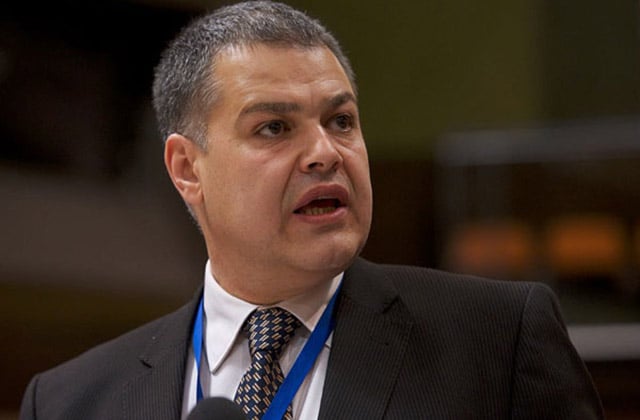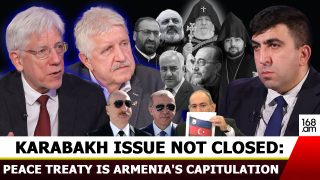Which should be Parliamentary Majority and How Electronic Registration will be Performed?—David Harutyunyan Introduces New Electoral Code

New Electoral Code has been confirmed at yesterday’s Government session. It will be submitted to the National Assembly. During the session the draft bill was introduced by David Harutyunyan, Head of the Government Staff.
D.Harutyunyan stated that on basis of the draft bill lay constitutional amendments, after which RA President Serzh Sargsyan defined the terms, during which draft bills to laws should be developed, which derive from the Constitution.
“Term for this package has been defined—March 1, which means, we had only 13 workdays to develop the package. We worked out the package, as there was no Governmental session on March 1, and it wasn’t appropriate to hold and extraordinary session, we introduce it today. The working group was performing really hard, and we had an alternative, when the president was defining the terms. The first alternative: main time for discussions was implemented by the Government itself, so that the latter develops active political discussions and forms a package close to the final version, before sending it to the National Assembly. The second alternative: mainly stress on political discussions in the National Assembly. I consider, all these were conditioned by the circumstance, that the Constitution itself defined a term for the package. It was 1 June 2016. I think the decision was right, that duty of main discussions moved to the political field, to a body, where all political palette is available, and not that of the Government. That’s why such a short term has been defined for the Government,” David Harutyunyan clarified.
Introducing main principles of package development, D.Harutyunyan stated, that elections of heads of communities in Gyumri and Vanadzor were held indirectly, i.e. formation of a member of the council of elders was held by the proportional system. This means, that Yerevan’s model will function in these two cities as well.
. He stated that the National Assembly should be formulated as a result of proportional elections, as such, the Constitution doesn’t provide majoritarian elections.
Touching upon formation of Central Electoral Commission (CEC), D.Harutyunyan stated, that its order has radically been changed, it should be developed by the National Assembly: to provide proper political balance it’s mentioned that CEC should be formed by 5/3 of votes, which comprises 60% of MPs.
In his words, restrictions have been implemented as well, “CEC member, including CEC Chairman can’t be elected in the Commission more than twice. This is also a crucial criteria, which will grant the opportunity for proper electoral administration, providing, on the one hand, maximal professionalism, and on the other hand—regular update and proper representativeness.”
David Harutyunyan mentioned, that in working out the package, remarks and suggestions by OSCE/ODIHR observation mission on elections held in May 2012 and February 2013.
“The Constitution introduced a new concept into legal culture, i.e. stable Parliamentary majority. If an attempt is made to shift to Parliamentary governance system, then quite naturally, everything should have been done to provide proper grounding, model, and stable majority was on the basis of that model. The Constitution didn’t define what stable majority is. We propose to consider 54% of NA MPs a stable majority.”
David Hariutyunyan said, that models for proportional electoral system are numerous.
“If we followed the simplest model of proportional electoral system, the one currently operates (as 90 MPs are elected by proportional electoral system), we should have come across with a serious shortcoming, which is rather spread in other countries, when the voter and the elected are alienated e.g. MPs elected by proportional electoral system. They don’t represent interests of any specific sector of Armenia. They represent the whole republic. The working group, which was developing the draft bill set a goal to work out a proportional model, which provides the opportunity, on the one hand, providing all the advantages of proportional model, however, guaranteeing that voter of certain area knows who his/her MP is, whom he/she may apply, to whom he/she may present his/her political demands, and by means of who he/she will express his/her vote in the parliament. This Electoral Code tries to solve this issue. The solution is the following: Armenia is being divided into 13 electoral constituencies, and each electoral constituency political parties represent their electoral list, typical to that area. The candidate shouldn’t be represented in two different constituencies, and from here it’ll be clear which MPs will appear in the Parliament. And the other part of proportional model is provided via another principle, when 50% of MPs will be represented from the constituencies, and the other 50% will be represented from the list.”
David Harutyunyan expressed a view that electoral model will provide an opportunity to develop strong political representativeness with time, which is crucial for proper governance of the country.
He noted, that after distribution of the seats it’s studied what distribution is implemented in the parliament. If any political power obtained 50%+1 vote, this means National Assembly has been formed:
“We offer that parties obtained 50%+1 vote, should be supplemented to 54%, naturally, in case, if it didn’t obtain more than 54% votes. If more votes are obtained, it’s maintained, but if any party obtained 50%+1vote, votes are added on account of that party and not of other parties, so that in total the party had 54% of votes. If, however, any party obtained 50%+1vote (which, perhaps, is a more likely model), then it’s anticipated, that probably, political powers build coalition. For the purpose, that it wasn’t a motley coalition, the following model is offered: no more than 3 powers, which obtained mandate in the Parliament, made a coalition. And if that coalition has 50%+1vote, and no more, than 50%, it also obtains votes, so that it provides stable parliamentary majority. If coalition isn’t formed, we pass on to the second round.”
In the coming Parliament 4 mandates will be allocated to national minorities, which are introduced by political powers.
David Harutyunyan mentioned, that first and foremost electronic registration would be provided. Voter list is divided into sections, inserted in the electronic device. Exactly this device provides a person the opportunity to vote. To obtain permit for voting, a citizen should submit a passport, the device reads the information, and if, turns out that the person isn’t included in the list of that polling station, for the first time the document is introduced, the device gives permit to vote via check. With red or green light the device illustrates the decision.
David Harutyunyan said, it’s proposed, that ballot of each political party had different color, which will provide the opportunity to understand whether votes to other parties where given or no. He said, that there are a range of solutions, on which political discussion should be launched: sealing the envelope is replaced by stapling of the envelope and the ballot.
D.Harutyunyan stated, that project submitted to Venice Commission and the one proposed by him are different, on account of short deadlines, works needed to be implemented in parallel.
Hrayr Tovmasyan, Head of NA Staff, offered to consider the draft bill urgent. D.Harutyunyan clarified, that the process shouldn’t be artificially developed.
By Ofelya Hovhannisyan

























